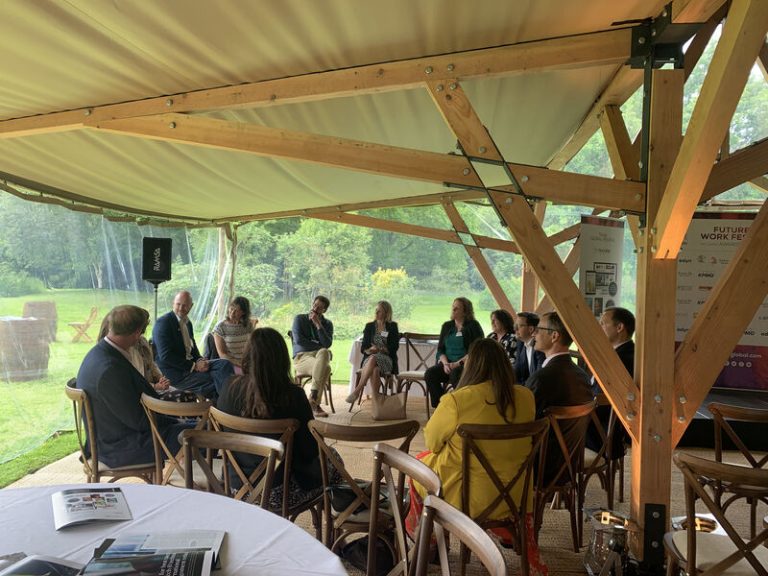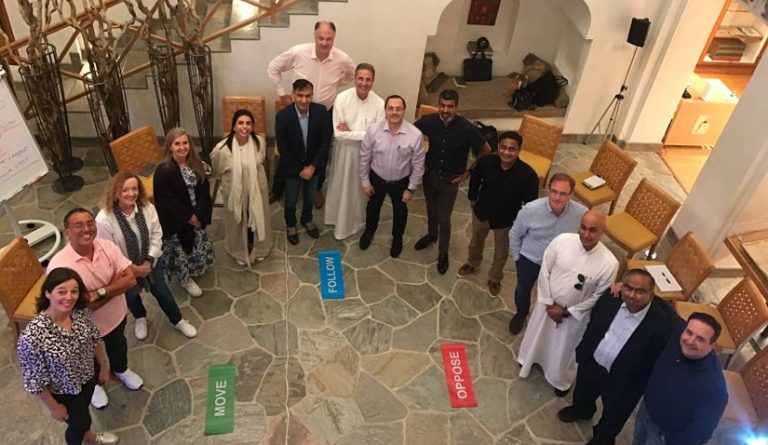In my latest Now We’re Talking podcast episode, I had the pleasure of speaking with Anne Power, author of Contented Couples, about the art of maintaining a loving, long-term relationship. What struck me in our conversation was how the skills that sustain a thriving partnership—deep listening, navigating conflict, and repairing ruptures—are the very same skills that great leaders must develop.
Relationships, whether at home or in the workplace, require continuous attention and care. They don’t stay strong on their own. Like physical fitness, building the muscles of love—trust, communication, and understanding—takes deliberate practice. But too often, we focus on getting things done rather than the quality of our conversations. We work on our strategies but neglect our relationships. We perfect our presentations but forget to truly listen.
The Bridge Between Relationships and Leadership
In my latest book Now We’re Talking, I explore how our ability to navigate difficult conversations is the key to unlocking deeper connections. In a leadership context, this leads to better decisions, aligned actions and ‘tight’ teams. In Chapter 6, ‘Build a Bridge’, I highlight the importance of deep listening—mirroring, validating, and empathising—to create a shared understanding in high-stakes conversations (for more on these three practices of deep listening, read my blog on ‘The most important leadership skill.’) This practice is essential whether you are telling your boss you’re leaving, having a tricky conversation with a colleague, or resolving conflict with a loved one.
When we think about conflict, we often assume that talking and saying our piece is the solution. But, as negotiation expert and author Simon Horton points out, real breakthroughs happen when we “listen them into it.” Our cultural bias toward speaking over listening leads us to believe that we need to assert our way out of a problem. Yet, the opposite is often true.
The same principle applies in personal relationships. Anne Power’s research on contented couples reveals that their ability to sustain love over the years isn’t because they avoid conflict, but because they know how to navigate it. They understand how to listen deeply, hold space for each other, and repair when things go wrong. The difference between a relationship that thrives and one that withers isn’t the absence of conflict—it’s the ability to handle it well.
Leaders as Lovers of Dialogue
For leaders, mastering the art of difficult conversations is as crucial as it is in intimate relationships. Leaders who fail to listen well risk eroding trust, just as partners who fail to hear each other drift apart. The ‘SCARF’ model, developed by David Rock, identifies key social threats—Status, Certainty, Autonomy, Relatedness, and Fairness—that trigger defensive reactions. When these are activated, whether in the boardroom or the bedroom, dialogue often breaks down.
By recognizing our triggers and practicing deep listening, we create the conditions for dialogue to flourish. As I illustrate in Now We’re Talking, when people feel truly heard—whether in a corporate setting or a romantic relationship—they are far more likely to engage constructively, share their truth, and find creative solutions.
Learning from Jegan and Mea’s Story
One powerful example of this comes from Now We’re Talking, where I share the story of Jegan and Mea, a couple who also ran a business together. They met at a jive class and quickly connected, marrying within a year and launching a sustainability-focused magazine. However, as their business grew, so did their conflicts. Financial pressures and the blurring of work and personal life created a strain that led them to consider both divorce and starting a family at the same time.
When Jegan and Mea came to my workshop, they were trapped in repetitive arguments and struggling to communicate effectively. Through learning the three pillars of deep listening—mirroring, validating, and empathising—they began to rebuild trust. Instead of reacting defensively, they learned to reflect back what the other was saying, acknowledge the legitimacy of their partner’s perspective and show empathy for each other’s struggles.
This shift transformed not just their relationship but also their business. Over time, they found a way to air their frustrations constructively, make joint decisions with less conflict, and bring back the warmth that had initially drawn them together. Today, they continue to grow both their relationship and their company, demonstrating that deep listening isn’t just a tool for couples—it’s a survival skill for anyone navigating meaningful partnerships, professional or personal. As Mea reflected when I caught up with them ten years after we’d worked together:
“We carry on finding ways to talk about the not-often-easy topics of our lives, including finances, business and now parenting issues with the ultimate challenge of having two children. Deep listening, real understanding and the decision to be unconditionally loving has helped us to choose the path of the heart in every moment. Thank you for being one of the inspirational diamonds on our path!”
Mea’s note moved me. It was a stirring reminder of how using the humble but powerful tool of dialogue can transform a business and a personal relationship. The precious gift of being heard and speaking candidly together is the real magic of a relationship and the key to bridge-building.
Love as a Leadership Skill
Love goes way beyond having a warm feeling or feeling a flush of excitement. One of the best definitions of love I’ve come across is from best-selling author Neale Donald Walsch who defines Love and Fear as the two fundamental emotions from which all human thoughts and actions stem. He writes:
“Fear is the energy which contracts, closes down, draws in, runs, hides, hoards, harms. Love is the energy which expands, opens up, sends out, stays, reveals, shares, heals.”
Love in leadership is inclusive, unifying and ‘contactful.’ It brings connection, joy, and alignment with what’s best for a whole ecosystem of stakeholders, not just an elite few. When leaders act from love, they are acting from the best versions of themselves.
Fear is the opposite of love. It is the belief in separation, limitation, and lack. Fear isolates and ‘makes wrong.’ It leads to actions driven by survival and ‘might is right’ rather than connection. Every negative emotion—anger, hatred, jealousy—ultimately stems from fear.
Walsch states that every decision we make is rooted in either love or fear, and that choosing love over fear aligns us with our true purpose and highest potential.
What if…?
Imagine if we approached leadership with the same level of care and curiosity that we bring to our most cherished relationships. What if, instead of trying to “win” the argument or prove our point, we focused on building a bridge?
In my coaching work, I’ve seen time and again how leaders transform when they develop these relational muscles. By adopting the same practices that sustain love—listening deeply, responding with empathy, and staying engaged even when it’s hard—they cultivate trust, inspire teams, and create resilient organizations.
So, whether you’re leading a team or loving a partner, consider this: the way you show up in conversation is shaping your relationships more than you realise. The question isn’t whether conflict will arise, but whether you have the skills to navigate it well.
Are you building the muscles of love? As Mahatma Gandhi said, “Love is the strongest force the world possesses and yet it is the humblest imaginable.”
To hear more insights from Anne Power on how contented couples sustain their bond through conversation, tune in to our latest ‘Now We’re Talking’ podcast episode. You can listen to this episode here.
References
Horton, S. (2022) Change their Mind: 6 practical steps to persuade anyone anytime
Power, A. (2022) Contented Couples: Magic, Logic or Luck?
Walsch, N. D. (2009) Conversations with God: Book One






